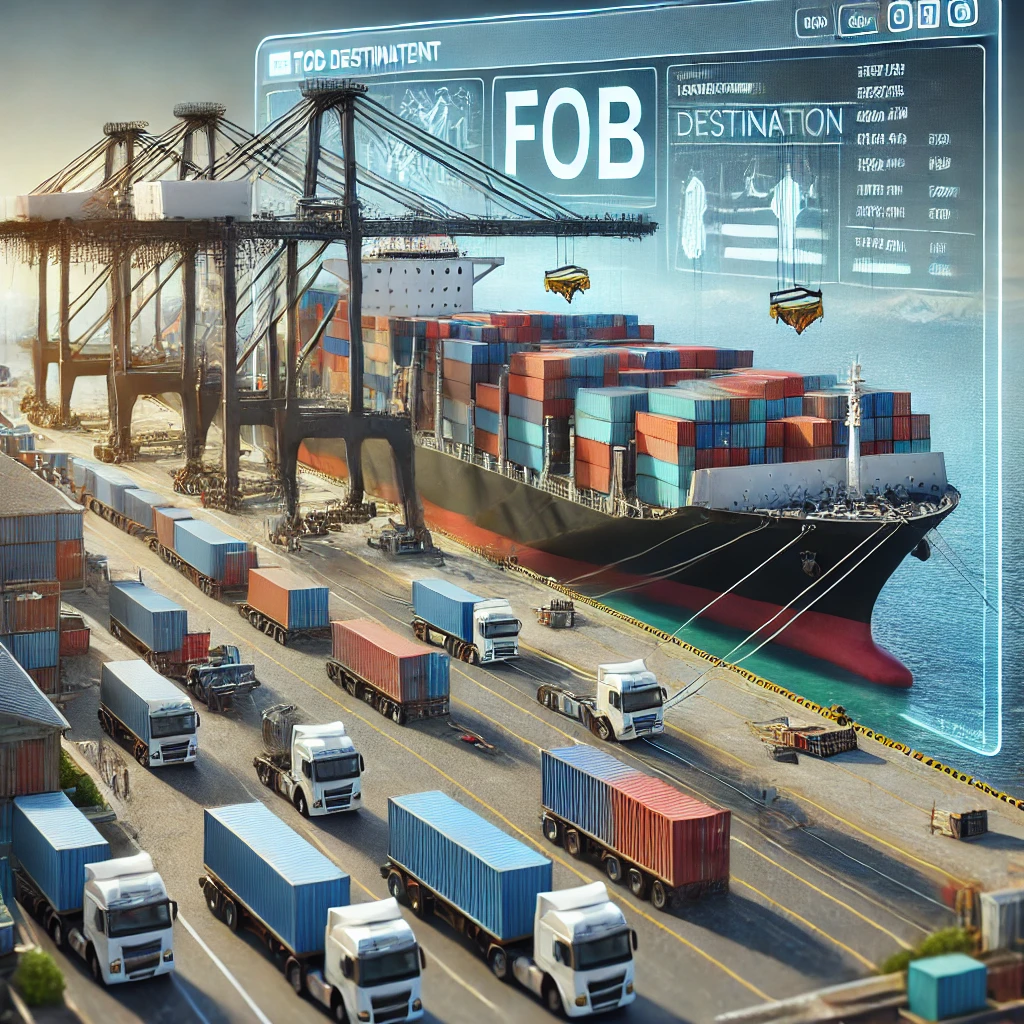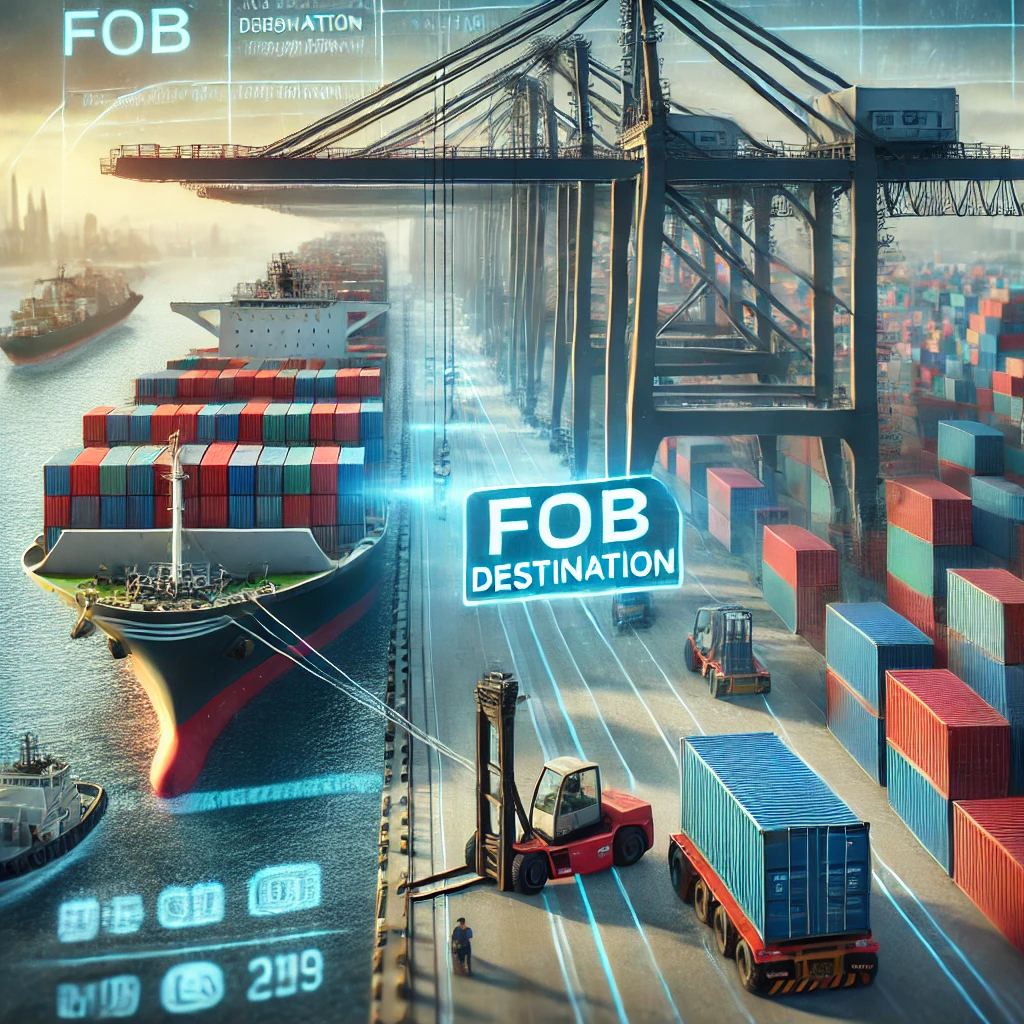Exploring FOB Destination in Detail

What is FOB Destination?
FOB Destination (Free On Board Destination) is an Incoterm used to define the point at which the responsibility and ownership of goods transfer from the seller to the buyer. Under FOB Destination, the seller retains ownership and responsibility for the goods until they reach the buyer’s specified location. This term is commonly used in international shipping agreements to clarify who bears the risks and costs associated with transportation.
The term FOB refers to the Free on Board point, and when coupled with “Destination,” it indicates that the seller is responsible for the goods during transit and must cover all associated shipping costs and risks until the goods arrive at the destination.
Key Features of FOB Destination
- Seller’s Responsibility: Under FOB Destination, the seller is responsible for all costs and risks associated with transporting the goods until they reach the buyer’s location.
- Risk Transfer: The risk of damage, loss, or theft of goods remains with the seller until the goods are delivered to the buyer’s destination.
- No Transfer of Ownership Until Delivery: The buyer does not take ownership of the goods until they arrive at the designated delivery point.
- Shipping Costs: The seller is responsible for the shipping costs and must arrange for transportation and delivery to the buyer’s specified address.
- Customs and Clearance: In many cases, the seller also assumes responsibility for handling customs duties and clearance.

How FOB Destination Works
FOB Destination works by clarifying when and where the responsibility for the goods changes hands between the seller and the buyer. Here’s a typical breakdown of how it works:
- Seller’s Responsibility: Once the seller has shipped the goods, they remain responsible for any damage, loss, or delays that occur during transportation. The seller arranges the freight carrier, shipping costs, and transportation insurance, ensuring the goods are delivered safely.
- Shipment Transit: During the journey, the goods are in transit, and the seller bears any risks involved, such as the risk of damage or loss. If the goods are delayed, the seller is responsible for resolving the issue with the freight carrier.
- Delivery to Buyer: The transfer of risk and ownership takes place when the goods arrive at the agreed destination. At this point, the buyer takes possession of the goods, and the seller’s responsibility ends.
- Buyer’s Responsibility: Once the goods have been delivered to the destination, the buyer is responsible for any further costs, including customs clearance, unloading, and other post-delivery expenses.
FOB Destination vs. FOB Origin
To better understand FOB Destination, it’s important to contrast it with FOB Origin, another common shipping term. While both terms are related to the point of responsibility during shipping, they differ significantly:
- FOB Destination: The seller retains responsibility and ownership until the goods are delivered to the buyer’s destination.
- FOB Origin: The buyer assumes responsibility for the goods as soon as they leave the seller’s premises, including the risks and costs associated with transportation.
In short, with FOB Destination, the seller manages the risks and costs of the shipping process until the goods reach the buyer, while with FOB Origin, the buyer assumes responsibility as soon as the goods leave the seller’s facility.

Practical Uses of FOB Destination
- International Trade: FOB Destination is often used in international trade, where the buyer and seller may be located in different countries. This term provides clarity about who is responsible for shipping, insurance, and handling throughout the transit process.
- Supply Chain Management: Companies that handle goods on behalf of clients may use FOB Destination to manage the shipment, insurance, and customs clearance until the goods are delivered to the buyer.
- Retail and Wholesale Transactions: Retailers or wholesalers who import products may use FOB Destination when negotiating with suppliers. This protects them from potential risks and ensures that goods are delivered to their warehouses without unexpected costs.
- Shipping Agreements: FOB Destination is also a key term in many shipping agreements between businesses. It allows both the seller and buyer to clearly define their responsibilities and reduce the risk of disputes during transit.

Benefits of FOB Destination for Businesses
1. Reduced Risk for Buyers
For buyers, FOB Destination provides peace of mind by shifting the risk of damage, loss, or theft to the seller until the goods are delivered. Buyers are not responsible for handling the shipment during transit, which can be beneficial when dealing with fragile or high-value items.
- Protection from Shipment Issues: Buyers are protected from the potential risks associated with transit delays, damage, or accidents, as these issues are the seller’s responsibility until delivery.
2. Simpler Logistics for Buyers
With FOB Destination, buyers do not have to worry about the complexities of organizing shipping and transportation. The seller takes care of all logistics and ensures the goods arrive at the agreed-upon location.
- No Need for Freight Management: The buyer does not need to coordinate shipping carriers or manage customs, reducing their workload and simplifying the logistics process.
3. Clearer Financial Planning
For sellers, FOB Destination ensures that the shipping costs and risks are accounted for upfront. Sellers can plan their shipping and transportation costs in advance, avoiding any unexpected charges that may arise during the shipment.
- Cost Transparency: Sellers are able to provide a clear cost structure to the buyer, which includes the shipping and delivery costs, allowing both parties to budget accordingly.
4. Improved Customer Satisfaction
For both buyers and sellers, FOB Destination improves customer satisfaction by ensuring that the shipment process is clear, predictable, and free of disruptions. Buyers appreciate knowing that their goods will be delivered without unexpected complications, and sellers can be confident that their goods will be received by the buyer.
- On-time Delivery: Since the seller is responsible for transportation, they are motivated to ensure that the shipment reaches the destination on time.
Conclusion
FOB Destination is a key shipping term that provides significant benefits to both buyers and sellers in the international shipping industry. By outlining who is responsible for the shipment at each stage of the process, FOB Destination reduces risk, simplifies logistics, and improves financial planning. It allows businesses to manage their shipping and transportation processes more efficiently and ensures that goods are delivered without unexpected costs or delays.
Understanding FOB Destination is essential for businesses involved in global trade, as it helps streamline operations, improve supply chain transparency, and foster positive relationships between buyers and sellers.
